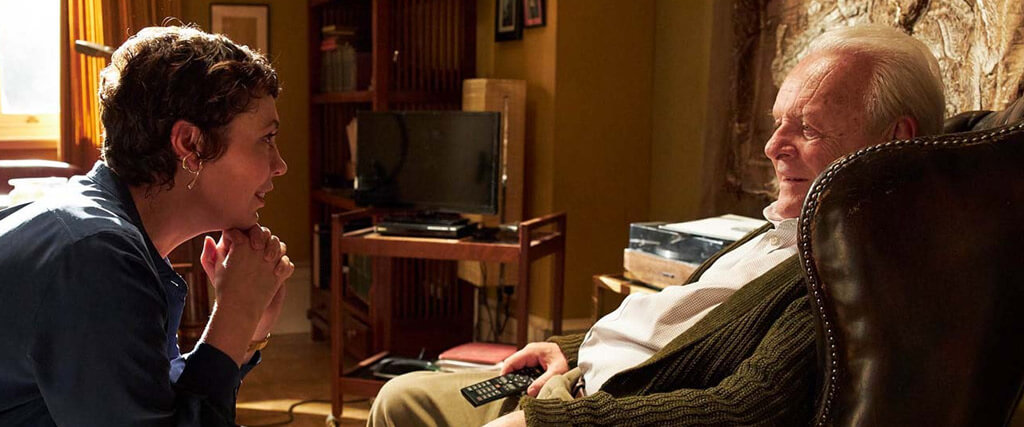
Sundance 2020
By Beau Stucki | February 9, 2020
I mushed into Sundance for my second year of reviewing for DFR, only to find myself shivering not just with the cold and snow, but also with chills and aches … I was sick at Sundance.
Even powers like Ron Howard, Elizabeth Moss, or Viggo Mortensen can lose their sway when you have to sway while watching them. This film critic was forced to retire mid-season for some R&R. Still, I made it out to nine feature films—including a couple of the “big ones.”
What follows are my reviews ranked in order of quality, with the best for last.
Blast Beat
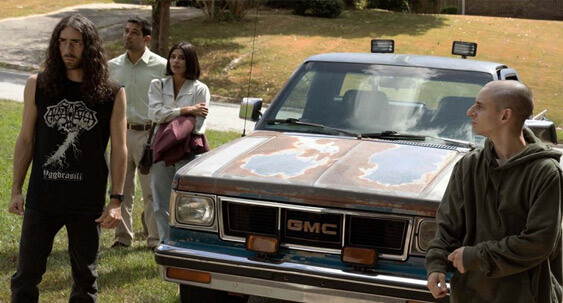 Blast Beat opens with a compelling immigration story, following two passionate brothers as they navigate their volatile dreams and emotions amidst the turmoil of relocating from Columbia to the United States. The movie derails exactly when it becomes a by-the-rails High School Movie, replete with just about every cliché conceived for that genre.
Blast Beat opens with a compelling immigration story, following two passionate brothers as they navigate their volatile dreams and emotions amidst the turmoil of relocating from Columbia to the United States. The movie derails exactly when it becomes a by-the-rails High School Movie, replete with just about every cliché conceived for that genre.
This well-trod route also serves to override the performance of the lead actors—real-life brothers Moisés and Mateo Arias, who struggle valiantly against the tide of on-the-nose dialogue, overwrought racial tension, and predictable story beats. Further, this is a film that suffers mightily from a disorienting actor-to-character age disparity.
More’s the pity, as Blast Beat has the pieces and manpower of an interesting drama about refugee displacement and human ambition. In this case, it is too deeply mired in a lackluster version of something we’ve seen before.
Kajillionaire
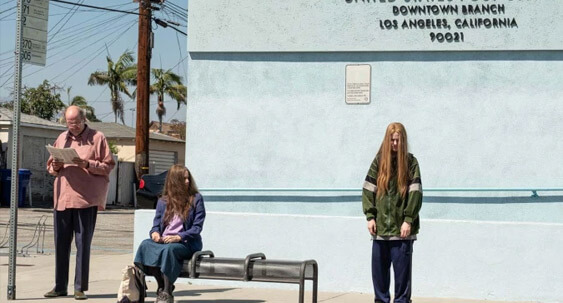 Whether the central family in director Miranda July’s third feature film are pariahs because they are ‘alternative,’ or ‘alternative’ because they are pariahs, is an open question—varying, perhaps, from character to character. What is sure is that they revel in their place—manipulating, scrounging, cheating, exploiting, and abusing indiscriminately. They wouldn’t comply with society at any cost, they tell us, and some of them we believe.
Whether the central family in director Miranda July’s third feature film are pariahs because they are ‘alternative,’ or ‘alternative’ because they are pariahs, is an open question—varying, perhaps, from character to character. What is sure is that they revel in their place—manipulating, scrounging, cheating, exploiting, and abusing indiscriminately. They wouldn’t comply with society at any cost, they tell us, and some of them we believe.
If there is unease in watching these characters snake about, there is also humor and quirk, even some poetry in the underhanded disquiet. These elements fail to culminate into a cohesive whole, but nonetheless they do provide some engaging distractions on the journey.
Slowly the story seems to settle on the only child of the family, the implausibly named Old Dolio (Evan Rachel Wood). She is the character closest to being an innocent, certainly she is the most manipulated person in the film, pulled in various directions by characters we are meant dislike, as well as those we are meant to find sympathetic. In as much as the story is about anything, it is about Old Dolio becoming conscious of the voids in her life and seeking to fill them with her stunted understanding of love. In her quest, she will truly (and perhaps naively) eschew materialism in a way her parents ostensibly did years ago.
Kajillionaire never seems to answer the questions it raises to the extent we are meant to feel it has. What we get instead is an oily sort of eccentric romp that sometimes entertains and other times perplexes.
Falling
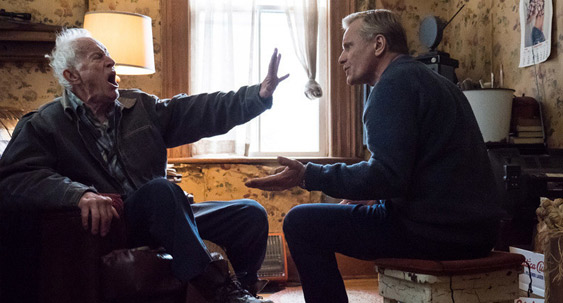 The Auteur Theory finds a new intensity in Viggo Mortensen. Not only does the famed actor play a substantial on-screen role, he directs, writes, and produces Falling—even composing the score, for good measure.
The Auteur Theory finds a new intensity in Viggo Mortensen. Not only does the famed actor play a substantial on-screen role, he directs, writes, and produces Falling—even composing the score, for good measure.
Perhaps unsurprisingly for an actor of Mortensen’s nuance and caliber, the film’s strongest elements come from the performances. Lance Henriksen is especially conspicuous in a raw and rough turn as an aging patriarch, his memory splintering as he buffets against values and trends of a generation he struggles to understand. The crass character’s power is somewhat undercut by the film’s consistent attempts to find humor in the stereotypical trope of a no-nonsense, no-filter old SOB shattering PC norms with off-kilter slurs and tirades.
Other performances find their mark. Hannah Gross makes some of the deepest impressions the film attains. Finer feelings come when Falling allows Henriksen and Mortensen to sit together, trying to sound out each other and years of pain they’ve stored up.
Whatever audiences make of the movie, it never really gathers enough momentum to free itself from being “that movie Viggo wrote and directed.” Yet, it doesn’t kill our desire to see just what he might make next.
Shirley
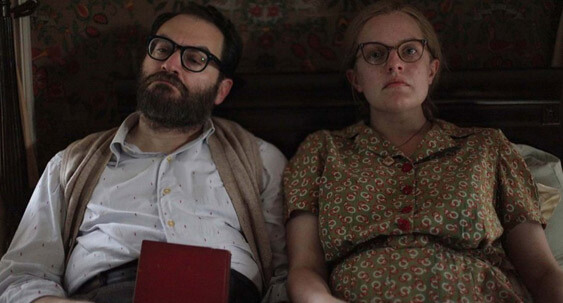 Indie darling Josephine Decker is back in the Sundance circuit. Her latest film still has a frenetic art film approach, but most audiences will find her new material easier viewing than, say, Madeline’s Madeline, her 2018 potpourri.
Indie darling Josephine Decker is back in the Sundance circuit. Her latest film still has a frenetic art film approach, but most audiences will find her new material easier viewing than, say, Madeline’s Madeline, her 2018 potpourri.
Shirley is a fractured and fractious deluge into the minds of famed horror author Shirley Jackson, and Rose (played by an ethereal Odessa Young), her houseguest-cum-servant-cum-muse. Sounds, images, and tone, each teeters with suppressed wildness and psychosexual tension—something firing scattershot in the direction of Greek myth or Shakespeare.
The film strikes most true, and is most deviously entertaining, in the glitteringly poisonous relationship between Elizabeth Moss in the title role (channeling the wit, intensity, and look of a Bette Davis), and Michael Stuhlbarg as her mercurial husband—each of the two accomplished actors burning with intellectual fervor and displaying their full range of powers. It is these scenes that show us what a feast the film might have been but for its madcap plunge down the rabbit hole of diseased genius and voyeuristic identity horror—choices made trite through popularity, and made tedious by the seeming ubiquity of the idea that audiences should consider them immediately important and edgy by dint of their appearing in a film at all. An arthouse-safety as sure as a checklist popcorn blockbuster.
It is all-too-easy for me to sit comfortably by and poke at Decker’s work with barbed words like “someday” or “promising.” But then, it is easy for the film to make me feel so—and, it’s impossible to write her singular talent off completely.
The Assistant
 Director Kitty Green’s narrative debut is a sidelong look at Hollywood’s most sensational scandal in recent memory—the infamous acts of Harvey Weinstein, the inadvertent springboard of the #MeToo movement. The movie wisely never mentions the name or shows the person of Weinstein, through his presence, and all it represents, hangs over each scene like a sickly mist. Instead, we follow The Assistant herself (Julia Garner) as she and countless others drone about tirelessly to please “Him” and follow-out “His” every order.
Director Kitty Green’s narrative debut is a sidelong look at Hollywood’s most sensational scandal in recent memory—the infamous acts of Harvey Weinstein, the inadvertent springboard of the #MeToo movement. The movie wisely never mentions the name or shows the person of Weinstein, through his presence, and all it represents, hangs over each scene like a sickly mist. Instead, we follow The Assistant herself (Julia Garner) as she and countless others drone about tirelessly to please “Him” and follow-out “His” every order.
“Drone” is an apt word. The movie has a monotonous hum—as though we are listening to the buzz of one of the fluorescent bulbs in the production office. The energy within that production office is so impossibly dour, even given the sober subject matter, that we are forced to consider the atmosphere as stylized rather than realistic. The movie is stripped of music as well; instead of typical Hollywood fun, we suffer through this almost-thriller under the minutiae of being a grunt-worker in an environment laced with ugly implication and inference—just insidious enough to keep everyone from running out screaming.
If The Assistant fails to engage at a level that will make it a hit with general audiences, it still raps our knuckles in a way that leaves a smarting sting—a lingering impression of the gloomy systemic problems carefully crafted by powerful predators—and all without ever explicitly stating anything at all.
Summertime
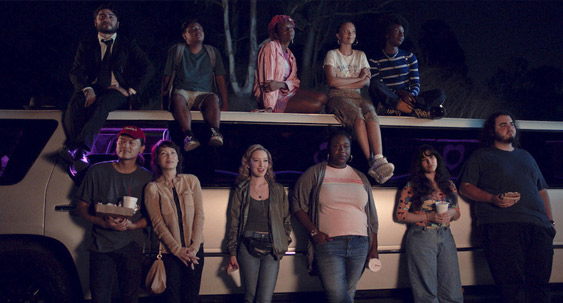 A youthful portrait—full of the hope, angst, and confusion familiar to those fortunate enough to live in a city where they can feel the weight of those years of delayed adulthood. In this case, that city is Los Angeles, CA, and Summertime tackles a bright bevy of characters on one fantastical summer’s day. We meet these dozens in a free-flowing glide through the streets and dwellings of the asphalt jungle. They represent the pluralism of Young America and each gives their voice against a selection of topical social issues (or injustices, if you will) as they might be gleaned from surfing Twitter feeds of the under-25s. Think, a sort of YouTuber-esque Dickens with modern sensibilities.
A youthful portrait—full of the hope, angst, and confusion familiar to those fortunate enough to live in a city where they can feel the weight of those years of delayed adulthood. In this case, that city is Los Angeles, CA, and Summertime tackles a bright bevy of characters on one fantastical summer’s day. We meet these dozens in a free-flowing glide through the streets and dwellings of the asphalt jungle. They represent the pluralism of Young America and each gives their voice against a selection of topical social issues (or injustices, if you will) as they might be gleaned from surfing Twitter feeds of the under-25s. Think, a sort of YouTuber-esque Dickens with modern sensibilities.
The many lives portrayed in Summertime are told through poems written by the actors themselves. And, like a particularly eclectic (but strictly youthful) anthology of poems, the movie’s moments vary in tone, style, quality, and depth. Sometimes the transitions are jarring and sometimes that jarring note is poignant or humorous or awkward. Sexuality, indecision, heartbreak, ambition, entitlement, kindness, vengeance, and inadequacy are only some of the themes touched on, but none more than capitalism. And the film captures the callow ambivalence toward capitalism we expect in the young western people in this new century. This engenders some of the film’s most nuanced and funny observations, as well as several of its most unclear and confusing.
Summertime is full of what we call “heart” and perhaps constrained by forcing a disparate amalgam, rather than a series of vignettes. Or even Instagram stories.
Minari
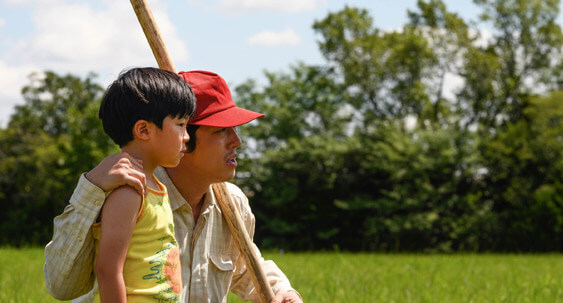 Like the Sundance favorite of last year, The Farewell, this season’s top movie, Minari, concerns an expatriate family in America, gleaned from real life and navigating hills and valleys both cultural and generational. However, Minari is much more bucolic and quietly faith-centric. Contemplative in tempo. A warm bath on a pleasant day, though not without serious conflicts eliciting sincere empathy.
Like the Sundance favorite of last year, The Farewell, this season’s top movie, Minari, concerns an expatriate family in America, gleaned from real life and navigating hills and valleys both cultural and generational. However, Minari is much more bucolic and quietly faith-centric. Contemplative in tempo. A warm bath on a pleasant day, though not without serious conflicts eliciting sincere empathy.
In a story that might justly and easily preach against racism, the ethnic conflicts are bumbling misunderstanding rather than spiteful prejudice, and we are invited to smile in our discomfort. Director Lee Isaac Chung calls it a story about “average people,” not the “bigoted minority.”
Minari’s clean beats and effortless smallness is juxtaposed by a biblical sense of pathos and redemption—a gnawing fatalism, drawing the family deeper into a fairytale that might be grim or happy. If this sounds rather highbrow, it is worth mentioning the movie delights in punctuating scenes with childish, even scatological, humor. It is to the credit of all that, despite the balancing of these many parts, we never doubt the motivations and relationships of each principal character.
Minari will just as nimbly please audiences at-large as it did within the cold confines of Park City this festival season.
Rebuilding Paradise
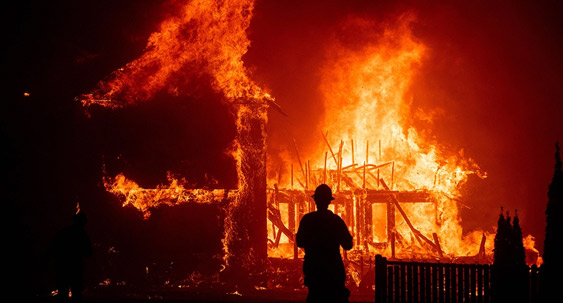 Much has been written and said in the past few years of what is lost when a movie is viewed at home rather than in a cinema. Few movies could emphasize the loss as acutely as Ron Howard’s Rebuilding Paradise. The movie’s opening few minutes are a blistering hellscape of smoke and flame—horrifyingly real footage from the fatal fire that tore through California in 2018, laying waste to the titular town of Paradise.
Much has been written and said in the past few years of what is lost when a movie is viewed at home rather than in a cinema. Few movies could emphasize the loss as acutely as Ron Howard’s Rebuilding Paradise. The movie’s opening few minutes are a blistering hellscape of smoke and flame—horrifyingly real footage from the fatal fire that tore through California in 2018, laying waste to the titular town of Paradise.
Our digital age allows such intimate views of devastation. What would the world be had iPhones existed at the sacking of Rome, the eruptions of Mounts Krakatoa or Vesuvius, the bombing of London? These devices work wonders in capturing candid images, but fall woefully short by comparison in displaying these images without the gravitas of a dark room and towering silver screen.
As the title suggests, the documentary’s focus is on the aftermath and reconstruction, rather than the destruction itself. We follow people of the community as they attempt to reconcile what has occurred and meet both the expected and unexpected challenges resulting from a natural disaster.
Ron Howard has explicitly stated the movie posits no message, political or otherwise, but it is difficult not to feel a certain parabolic quality when a place called Paradise is ravaged so unexpectedly and so completely. Blame is bandied about by some individuals and our minds cannot help but wonder at the terrible possibilities, or echo with the courageous human impetus to overcome.
The Father
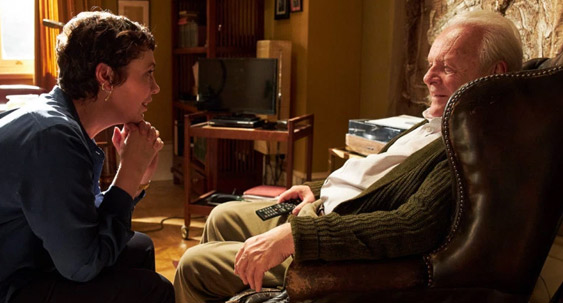 The Father is a story best approached cold. The movie is, among many other things, a deconstruction of our understanding of motion pictures, of the way we watch them. This approach could work as an entertainment, but here it is used to great effect as a tool to help us (nay, to force us) to empathize with a man who is losing his sense of place and time—what is a mind without those bedrock fundamentals, Place & Time?
The Father is a story best approached cold. The movie is, among many other things, a deconstruction of our understanding of motion pictures, of the way we watch them. This approach could work as an entertainment, but here it is used to great effect as a tool to help us (nay, to force us) to empathize with a man who is losing his sense of place and time—what is a mind without those bedrock fundamentals, Place & Time?
Pay careful attention to the architecture presented by debut filmmaker Florian Zeller, to the way spaces are presented and photographed. Look at the trappings of modern life, especially a certain wristwatch, and the meaning they take as the film unravels and descends.
Sony Pictures has already purchased The Father. If they play it smart, the movie will be released during Oscar season where it will at least garner buzz for the lead performance by Anthony Hopkins—it isn’t the venerable actor’s greatest performance, but it is a resonant one and used deftly within a resonant film. There isn’t, in fact, a player in the movie to complain of—each member of the cast has moments to lull and bewilder.
At one point in the movie, a character examines light broken and scattered by a prism, reflecting in capricious slices. A telling image, in this instance.

Beau Stucki is a traveling writer and entrepreneur. He co-runs the film discussion group This Movie Club.
Unlock More from Deep Focus Review
To keep Deep Focus Review independent, I rely on the generous support of readers like you. By joining our Patreon community or making a one-time donation, you’ll help cover site maintenance and research materials so I can focus on creating more movie reviews and critical analysis. Patrons receive early access to reviews and essays, plus a closer connection to a community of fellow film lovers. If you value my work, please consider supporting DFR on Patreon or show your support in other ways.
Thank you for your readership!
Brian Eggert | Critic, Founder
Deep Focus Review




